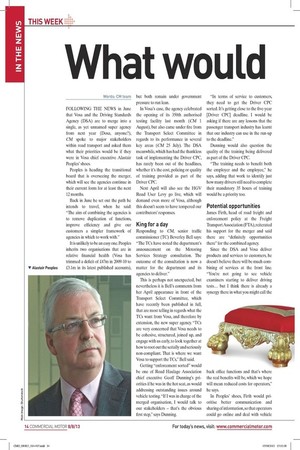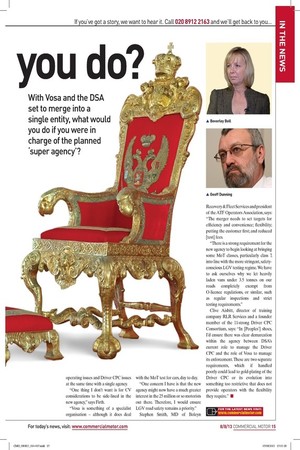What would
Page 11

Page 12

If you've noticed an error in this article please click here to report it so we can fix it.
you do?
With Vosa and the DSA set to merge into a single entity, what would you do if you were in charge of the planned super agency'?
FOLLOWING THE NEWS in June that Vosa and the Driving Standards Agency (DSA) are to merge into a single, as yet unnamed super agency from next year (Dosa, anyone?), CM spoke to major stakeholders within road transport and asked them what their priorities would be if they were in Vosa chief executive Alastair Peoples' shoes.
Peoples is heading the transitional board that is overseeing the merger, which will see the agencies continue in their current form for at least the next 12 months.
Back in June he set out the path he intends to travel, when he said: "The aim of combining the agencies is to remove duplication of functions, improve efficiency and give our customers a simpler framework of agencies in which to work with." It is unlikely to be an easy one. Peoples inherits two organisations that are in relative financial health (Vosa has trimmed a deficit of £47m in 2009-10 to £3.1m in its latest published accounts),
but both remain under government pressure to run lean.
In Vosa's case, the agency celebrated the opening of its 350th authorised testing facility last month (CM 1 August), but also came under fire from the Transport Select Committee in regards to its performance in several key areas (CM 25 July). The DSA meanwhile, which has had the thankless task of implementing the Driver CPC, has rarely been out of the headlines, whether it's the cost, policing or quality of training provided as part of the Driver CPC.
Next April will also see the HGV Road User Levy go live, which will demand even more of Vosa, although this doesn't seem to have tempered our contributors' responses.
King for a day
Responding to CM, senior traffic commissioner (TC) Beverley Bell says: "The TCs have noted the department's announcement on the Motoring Services Strategy consultation. The outcome of the consultation is now a matter for the department and its agencies to deliver."
This is perhaps not unexpected, but nevertheless it is Bell's comments from her April appearance in front of the Transport Select Committee, which have recently been published in full, that are most telling in regards what the TCs want from Vosa, and therefore by extension, the new super agency. "TCs are very concerned that Vosa needs to be cohesive, structured, joined up, and engage with us early, to look together at how to root out the serially and seriously non-compliant. That is where we want Vosa to support the TCs," Bell said.
Getting "enforcement sorted" would be one of Road Haulage Association chief executive Geoff Dunning's priorities if he was in the hot seat, as would addressing outstanding issues around vehicle testing. "If I was in charge of the merged organisation, I would talk to our stakeholders — that's the obvious first step," says Dunning.
"In terms of service to customers, they need to get the Driver CPC sorted. It's getting close to the five-year [Driver CPC] deadline. I would be asking if there are any lessons that the passenger transport industry has learnt that our industry can use in the run-up to the deadline."
Dunning would also question the quality of the training being delivered as part of the Driver CPC.
"The training needs to benefit both the employer and the employee," he says, adding that work to identify just how many drivers still need to complete their mandatory 35 hours of training would be a priority too.
Potential opportunities
James Firth, head of road freight and enforcement policy at the Freight Transport Association (FTA), reiterated his support for the merger and said there are "definitely opportunities there" for the combined agency. Since the DSA and Vosa deliver products and services to customers, he doesn't believe there will be much combining of services at the front line. "You're not going to see vehicle examiners starting to deliver driving tests... but I think there is already a synergy there in what you might call the
back office functions and that's where the real benefits will be, which we hope will mean reduced costs for operators," he says. In Peoples' shoes, Firth would prioritise better communication and sharing of information, so that operators could go online and deal with vehicle
operating issues and Driver CPC issues at the same time with a single agency.
"One thing I don't want is for CV considerations to be side-lined in the new agency," says Firth. "Vosa is something of a specialist organisation — although it does deal
with the MoT test for cars, day to day.
"One concern I have is that the new agency might now have a much greater interest in the 25 million or so motorists out there. Therefore, I would ensure LGV road safety remains a priority." Stephen Smith, MD of Boleyn
Recovery &Fleet Services and president of the ATF Operators Association, says: "The merger needs to set targets for efficiency and convenience; flexibility; putting the customer first; and reduced [test] fees.
"There is a strong requirement for the new agency to begin looking at bringing some MoT classes, particularly class 7 into line with the more stringent, safetyconscious LGV testing regime. We have to ask ourselves why we let heavily laden vans under 3.5 tonnes on our roads completely exempt from 0-licence regulations, or similar, such as regular inspections and strict testing requirements." Clive Aisbitt, director of training company RLR Services and a founder member of the 11-strong Driver CPC Consortium, says: "In [Peoples] shoes, I'd ensure there was clear demarcation within the agency between DSA's current role to manage the Driver CPC and the role of Vosa to manage its enforcement. These are two separate requirements, which if handled poorly could lead to gold-plating of the Driver CPC or its evolution into something too restrictive that does not provide operators with the flexibility they require." •









































